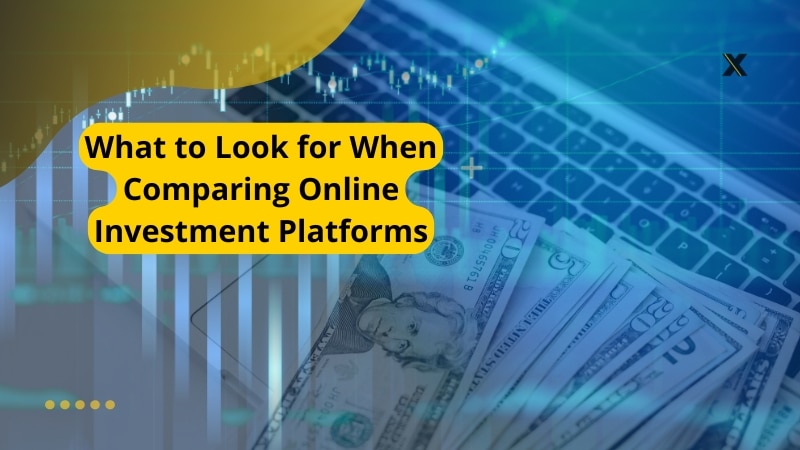Advertisements
In today’s fast-moving digital world, comparing online investment platforms has become essential for anyone who wants to invest wisely. With hundreds of platforms competing for your attention, each offering different fees, tools, and assets, finding the right one can be challenging.
But choosing carefully is crucial, after all, your investment platform will become your main financial partner, guiding your journey through the markets.
It’s precisely because of this abundance that investors, from beginners exploring their first portfolio to experienced traders managing diversified assets, must dedicate time to comparing online investment platforms carefully.
The digital revolution has democratized access to markets, allowing anyone to invest in global stocks, bonds, or ETFs from the comfort of their home. Yet, not every platform operates under the same principles of transparency, cost-efficiency, or investor protection. Making an uninformed choice can lead to frustration, hidden costs, or even exposure to unnecessary risks.
Advertisements
The rise of fintech companies has opened the door to a new generation of investors. These individuals, often younger and more tech-savvy, value autonomy, flexibility, and immediate access to market information.
For them, investing is no longer about complex spreadsheets or exclusive bank relationships. Instead, it’s about intuitive design, data-driven insights, and community-driven learning.
And yet, even for this new generation, comparing online investment platforms remains essential, because behind every beautiful interface lies a structure of fees, algorithms, and decision-making processes that can shape long-term results.
The Importance of Comparing Online Investment Platforms
In the modern digital economy, comparing online investment platforms has become a vital step for anyone seeking financial growth with strategy and confidence. With countless platforms competing for users, each offering distinct tools, fees, and investment opportunities, understanding these differences is essential.
Advertisements
The right platform can empower investors with autonomy, transparency, and accessibility, while a poor choice may lead to confusion, hidden costs, or lost opportunities. In this sense, comparison is no longer a luxury but a necessity, it’s the foundation for building a secure and consistent investment journey.
Moreover, the process of comparing online investment platforms ensures alignment between personal goals and the tools used to achieve them. Investors who prioritize Planning for Retirement Early, for instance, need platforms that offer automated contributions, diversified portfolios, and clear projections for long-term financial planning.
Others, who focus on active trading or wealth accumulation, may prefer fast execution, analytical tools, and greater flexibility. Therefore, comparing platforms is not merely about cost, it’s about finding the environment that matches your financial vision and supports sustainable growth.
Another critical aspect is trust and transparency. With online investing expanding rapidly, issues like cybersecurity, regulation, and data privacy have become central concerns.
Reliable platforms must demonstrate compliance with recognized authorities, protect user funds, and educate investors on responsible practices. By comparing online investment platforms, investors can identify which services prioritize safety, ethics, and education over aggressive marketing, transforming the act of investing into an informed, confident decision.
Ultimately, comparison builds empowerment. It helps investors choose platforms that not only meet their immediate needs but also adapt to their future goals. Whether your purpose is Planning for Retirement Early, achieving financial independence, or building generational wealth, thoughtful comparison ensures that your investment partner evolves with you.
What to Look for When Comparing Online Investment Platforms
Before opening your account, it’s worth evaluating some critical aspects that can influence both your performance and your experience as an investor.

1 – Fees and Costs
One of the main reasons investors switch platforms is cost. Trading commissions, account maintenance, and withdrawal fees can quietly eat away at your profits. Even small differences add up over time. Therefore, always check what fees are charged for buying and selling assets, converting currencies, and transferring funds.
Platforms with zero-commission trading might look attractive, but always read the fine print, some may compensate with wider spreads or hidden charges. A transparent fee structure is a sign of trustworthiness and long-term stability.
2 – Range of Investment Options Comparing Online Investment Platforms
Every investor has a different goal, and the platform you choose should offer the assets that fit yours. The best ones include a variety of markets such as stocks, ETFs, mutual funds, bonds, cryptocurrencies, and even fractional shares.
When comparing online investment platforms, ask yourself: does this service give me access to the assets I want today, and those I might want in the future? If your ambition is to diversify internationally or explore alternative investments like real estate or green energy, check whether the platform provides these opportunities.
3 – Ease of Use and Design
A powerful platform is useless if it’s confusing or frustrating to navigate. User experience matters more than ever, especially for new investors. Platforms with intuitive dashboards, mobile apps, and clear portfolio tracking tools make it easier to stay consistent and informed.
Also, pay attention to the educational resources offered. Good platforms provide tutorials, videos, and articles that help users understand markets and build confidence in their strategies.
4 – Security and Regulation
Trust is the foundation of any investment relationship. Before depositing your money, verify whether the platform is regulated by a recognized authority in its operating country. Regulation ensures that the company follows strict rules on transparency, data protection, and fund segregation.
Security is also essential. Multi-factor authentication, data encryption, and insurance for client funds are indicators of a responsible and safe platform. In a world where cyber threats are real, this factor should never be overlooked.
5 – Minimum Investments and Accessibility
Some platforms require only a few dollars to start, while others set higher barriers. Low-minimum accounts allow beginners to test the waters without major risk. Accessibility also means supporting multiple payment options, offering apps in your local language, and providing responsive customer service when you need help.
Different Types of Online Investment Platforms
Not all platforms serve the same purpose. Knowing what kind of service you’re dealing with can help you make smarter comparisons.
Self-directed brokers give investors full control. You choose what to buy, when to sell, and how to allocate your money. These platforms often include professional tools, but they also demand discipline and knowledge.
Robo-advisors, on the other hand, automate the investment process. They use algorithms to build and manage a portfolio according to your risk profile and goals. They’re perfect for those who prefer a hands-off approach or want long-term investing without daily management.
A growing trend is fractional investing apps, which allow users to buy small portions of expensive stocks. This opens the door for younger investors or those with limited capital to access global companies like Apple, Tesla, or Amazon.
Lastly, niche platforms focus on specific areas such as sustainable funds, real-estate projects, or peer-to-peer lending. These are ideal if you have a particular passion or want to align your investments with personal values, but they usually come with higher risk or lower liquidity.
How to Choose the Best Platform for You
Once you understand the landscape, the next step is to create your personal selection strategy. Start by defining your objectives. Are you saving for retirement, seeking passive income, or aiming for short-term gains? Your answer determines what platform features matter most.
Then, shortlist a few platforms that seem promising. Visit their websites, explore their demo accounts if available, and read reviews from verified users. Pay attention to small details: how long it takes to withdraw funds, how transparent the reporting is, and how responsive the support team is.
When comparing online investment platforms, don’t just rely on star ratings or influencer recommendations. Focus on measurable criteria such as cost, user experience, product range, and reputation. If possible, test the platform with a small deposit before committing larger amounts.
Remember, what works for someone else might not work for you. Your perfect platform is the one that feels intuitive, aligns with your goals, and makes you feel confident about your decisions.
Mistakes to Avoid When Comparing Platforms
Even experienced investors can fall into common traps. One of the most frequent mistakes is focusing exclusively on low fees. While saving money is important, a platform with poor support or unreliable execution can cost far more in lost opportunities.
Another common error is ignoring the fine details of regulation. Always verify where the company is based and which authority supervises it. Unregulated or offshore brokers may promise big profits, but they can also disappear without warning.
Be careful with promotions that seem too good to be true. Welcome bonuses or free trades may sound appealing but sometimes come with hidden conditions. And finally, avoid choosing a platform just because a friend uses it, every investor has unique needs and habits.
Conclusion
In the end, comparing online investment platforms is much more than just reviewing features or fees, it’s about understanding how each option aligns with your personal goals and long-term financial vision.
Choosing the right platform determines how you interact with your money, how safely your assets are managed, and how efficiently your investments can grow over time. In a fast-changing digital environment, where innovation moves faster than regulation, taking time to compare gives you a decisive advantage.
Furthermore, comparison promotes awareness and discipline. It allows you to identify platforms that offer transparency, regulatory security, and tools that match your level of experience.
Whether you prefer an automated approach or a self-directed strategy, comparing helps you act consciously rather than impulsively. It’s a mindset that protects your wealth while giving you confidence to pursue your goals, such as Planning for Retirement Early or building financial independence with structure and strategy.
To explore official guidance on evaluating digital investment services and understanding investor protections, visit the U.S. Securities and Exchange Commission (SEC) website. It provides trustworthy insights about online investing, cybersecurity, and how to verify if a platform is properly registered.
In the modern financial world, knowledge and comparison remain the strongest forms of investment security, and by embracing the practice of comparing online investment platforms, you are already one step ahead toward smarter, safer investing.




